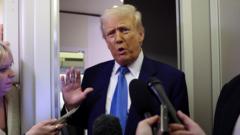Amid increasing pressure from President Trump regarding trade practices, India has taken significant steps to adjust its tariffs, particularly on heavyweight motorcycles, in hopes of appeasing the US and avoiding further trade disputes.
### Tensions Rise as India Adjusts Tariffs Amid Trump's Trade Threats

### Tensions Rise as India Adjusts Tariffs Amid Trump's Trade Threats
In response to Donald Trump's renewed emphasis on trade balance, India adjusts its tariffs to mitigate potential US retaliation, particularly concerning motorcycle imports.
India's response to Trump's tariff threats is multi-faceted, reflecting its desire to retain a favorable trade relationship while addressing concerns raised by the US leader. Last week, India cut import duties on heavyweight motorcycles, reducing tariffs from 50% to 30%. This move was seen as a pre-emptive attempt to encourage the entry of US brands such as Harley Davidson into the Indian market, while also aiming to counteract any potential tariffs that might be imposed by the US administration.
Industry experts note that India's latest tariff reductions signal a strategic shift in its trade policy, with the country aiming to facilitate US exports across various sectors. As India and the US maintain a robust trade relationship—boasting over $190 billion in bilateral trade—India's recent tariff adjustments indicate an eagerness to foster cooperation amidst Trump's "America First" stance, which has historically targeted nations with substantial trade surpluses, such as India.
Additionally, despite Trump's past characterizations of India as a "tariff king," India has made further efforts to minimize import taxes on various American goods, including satellite equipment and synthetic flavoring essences, demonstrating a determination to orient its policies towards mutual benefit.
However, even with these concessions, a critical hurdle remains: agricultural market access. While India removed retaliatory tariffs on a number of US agricultural imports this year, the potential for further concessions may run into domestic political challenges, suggesting that India will negotiate firmly on farming issues while maintaining its broader strategic alignment with the US.
Experts observe that Modi's personal rapport with Trump, combined with India's strategic importance in counterbalancing China's influence in the region, may provide leverage for India in managing this complex relationship. As leaders prepare for upcoming discussions, the outcome will likely influence both nations' future trade dynamics.
Industry experts note that India's latest tariff reductions signal a strategic shift in its trade policy, with the country aiming to facilitate US exports across various sectors. As India and the US maintain a robust trade relationship—boasting over $190 billion in bilateral trade—India's recent tariff adjustments indicate an eagerness to foster cooperation amidst Trump's "America First" stance, which has historically targeted nations with substantial trade surpluses, such as India.
Additionally, despite Trump's past characterizations of India as a "tariff king," India has made further efforts to minimize import taxes on various American goods, including satellite equipment and synthetic flavoring essences, demonstrating a determination to orient its policies towards mutual benefit.
However, even with these concessions, a critical hurdle remains: agricultural market access. While India removed retaliatory tariffs on a number of US agricultural imports this year, the potential for further concessions may run into domestic political challenges, suggesting that India will negotiate firmly on farming issues while maintaining its broader strategic alignment with the US.
Experts observe that Modi's personal rapport with Trump, combined with India's strategic importance in counterbalancing China's influence in the region, may provide leverage for India in managing this complex relationship. As leaders prepare for upcoming discussions, the outcome will likely influence both nations' future trade dynamics.






















